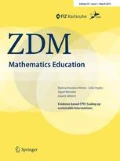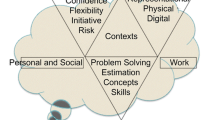Abstract
We investigate teachers’ practices in a whole-class context when they scaffold students’ learning in situations where students use technologies that facilitate group learning to solve mathematical problems in small groups. We describe teachers’ practices in order to evaluate their contribution to Whole-Class Scaffolding in the context of a course that was meant to facilitate learning to solve mathematical problems in small groups. Sixteen and twenty four junior high students took part in two iterations of a design research correspondingly. We identify six teacher practices. These practices include: (1) Presenting strategy-oriented problems in order to familiarize students with mathematical problem solving strategies and heuristics; (2) Decomposing a problem into stages; (3) Modelling the use of the dedicated technologies; (4) Preliminary Learning to Learn Together (L2L2) talk; (5) Routine L2L2 talk; and (6) Summative L2L2 talk. We conclude that scaffolding learning to solve mathematical problem together in a whole-class context is feasible with suitable technologies. This study also provides insights on the Whole-Class Scaffolding theory and on the ways group learning could enhance students’ ability to solve mathematical problems individually.





Similar content being viewed by others
References
Abdu, R. (2013). Peer scaffold in mathematical problem solving. In N. Rummel, M. Kapur, M. Nathan, & S. Puntambekar (Eds.), Proceedings of the computer supported collaborative learning conference (pp. 2–10). Wisconsin: Madison.
Abdu, R. (2015). The development of Situational-misconceptions in mathematical problem solving. In Proceedings of the 11th international conference of computer supported collaborative learning, Gothenburg, Sweden (to appear).
Abdu, R., de Groot, R. & Drachman, R. (2012). Teachers’ role in computer supported collaborative learning. In Y. Eshet-Alkalai, A., S. Caspieden, N. Geri, Y. Yair &Y. Kalman (Eds.), Learning in the technological era. Proceedings of the 7th chais conference for innovation in learning technologies (pp. 1–6). Raanana: The Open University of Israel.
Abdu, R., & Schwarz, B. B. (2012). “Metafora” and the fostering of collaborative mathematical problem solving. In C. Kynigos, J. E. Clayson, & N. Yiannoutsou (Eds.), Proceedings of constructionism 2012 conference: Theory, practice and impact (pp. 468–479). Greece: Athens.
Alexander, R. (2008). Culture, Dialogue and Learning: Notes on an emerging pedagogy. In Education, culture and cognition: Intervening for growth. international association for cognitive education and psychology (IACEP) 10th international conference (pp. 10–14). UK: University of Durham.
Andriessen, J., Baker, M., & Suthers, D. (2003). Argumentation, computer support, and the educational context of confronting cognitions. In Andriessen, J., Baker, M., and Suthers, D., (Eds.) Arguing to learn: Confronting cognitions in computer-supported collaborative learning environments (pp. 1–25). Dordrecht: Kluwer.
Cazden, C. (1979). Peekaboo as an instructional model: Discourse development at home and at school. Stanford Papers and Reports in Child Language Development, 17, 1–19.
Cifarelli, V., & Cai, J. (2005). The evolution of mathematical explorations in open ended problem solving situations. Journal of Mathematical Behavior, 24, 302–324.
Cobb, P., & Bauersfeld, H. (Eds.). (1995). The emergence of mathematical meaning: Interaction in classroom culture. Hillsdale: Lawrence Erlbaum Associates.
Cobb, P., Stephan, M., McClain, K., & Gravemeijer, K. (2001). Participating in classroom mathematical practices. The Journal of the Learning Sciences, 10(1&2), 113–164.
Cohen, L., & Manion, L. (1980). Research methods in education (2nd ed.). Dover: Croom-Helm.
Collins, A., Joseph, D., & Bielaczyc, K. (2004). Design research: Theoretical and methodological issues. The Journal of the Learning Sciences, 13(1), 15–42.
Derry, S. J., Pea, R. D., Barron, B., Engel, R. A., Erickson, F., Goldman, R., et al. (2010). Conducting video research in the learning sciences: Guidance on selection, analysis, technology, and ethics. The Journal of the Learning Sciences, 19(1), 3–53.
Design-Based Research Collective, 2003. Resource document. http://www.designbasedresearch.org/reppubs/DBRC2003.pdf. Accessed in 09 Oct 2014.
Dillenbourg, P. (1999). What do you mean by ‘collaborative learning’? In Dillenbourg, P. (Ed.) Collaborative learning cognitive and computational approaches (pp. 1–19). Oxford: Elsevier.
Dreyfus, T., Hershkowitz, R., & Schwarz, B. B. (2015). The nested epistemic actions model for abstraction in context—Theory as a methodological tool and methodological tool as theory. In A. Bikner-Ahsbahs, C. Knipping, & N. Presmeg (Eds.), Approaches to qualitative research in mathematics education: Examples of methodology and methods (Advances in mathematics education series). New York: Springer.
Feldman, A., & Minstrell, J. (2000). Action Research as a research methodology for the study of the teaching and learning of science. In Kelly, A., & Lesh, R. (Eds.) Handbook of research design in mathematics and science education (pp. 429–455). Mahwah: Lawrence Erlbaum Associates.
Hadas, N., Hershkowitz, R., & Schwarz, B. B. (2006). Inquiry learning with dynamic geometry tools. In Zohar, A. (Ed.) Inquiry based learning: An ongoing process (pp. 250–278). Magness Publishing House.
Hamilton, E., Lesh, R., Lester, F., & Yoon, C. (2007). The Use of reflection tools to build personal models of problem-solving. In R. Lesh, E. Hamilton, & J. Kaput (Eds.), Foundations for the future in mathematics education (pp. 347–365). Mahwah: Lawrence Erlbaum Associates.
Iiskala, T., Vauras, M., Lehtinen, E., & Salonen, P. (2011). Socially shared metacogntition of dyads of pupils in collaborative mathematical problem-solving processes. Learning and Instruction, 21, 379–393.
Kynigos, C., & Moustaki, F. (2016). Scaffolding students’ constructionist activity through shared dialogical workspaces. ZDM Mathematics Education, 48(1) (this issue).
Metafora team, (2013). Deliverable 3.3. Report of the Analysis of the Experiments. Resource document: http://www.metafora-project.org/www_metafora/jsmallfib_top/repository/03%20-%20WP3%20%20Activity%20design,%20classroom%20implementation%20and%20the%20assessment%20of%20learning%20outcomes/D.3.3_v10_FINAL.pdf. Accessed 09 Oct 2014.
Palinscar, A. S., & Brown, A. L. (1984). Reciprocal teaching of comprehension-fostering and comprehension-monitoring activities. Cognition and Instruction, 1, 117–175.
Pea, R. D. (2004). The social and technological dimensions of scaffolding and related theoretical concepts for learning, education, and human activity. The Journal of the Learning Sciences, 13(3), 423–451.
Pólya, G. (1945). How to solve it: A new aspect of mathematical method (1st ed.). Princeton: Princeton.
Puntambekar, S., & Hubscher, R. (2005). Tools for scaffolding students in a complex learning environment: What have we gained and what have we missed? Educational Psychologist, 40(1), 1–12.
Rowland, T., Turner, F., & Thwaites, A. (2014). Research into teacher knowledge: A stimulus for development in mathematics teacher education practice. ZDM—The International Journal on Mathematics Education, 46(2), 317–328.
Schoenfeld, A. H. (1985). Mathematical problem solving. New York: Academic Press.
Schoenfeld, A. H. (1992). Learning to think mathematically: Problem solving, metacognition and sense making in mathematics. In D. Grouws (Ed.), Handbook for research on mathematics teaching and learning (pp. 334–370). New-York: MacMillan.
Schoenfeld, A. H. (2007). Problem solving in the United States, 1970–2008: Research and theory, practice and politics. ZDM—The International Journal on Mathematics Education, 39(5–6), 537–551.
Schwarz, B.B., Neuman, Y., & Biezuner, S. (2000). Two “wrongs” may make a right…If they argue together!. Cognition & Instruction, 18(4), 461–494.
Schwarz, B.B., Hershkowitz, R., & Prusak, N. (2010). Argumentation and mathematics. In C. Howe & K. Littleton (Eds.), Educational dialogues: Understanding and promoting productive interaction (pp. 115–141). London: Routledge.
Schwarz, B.B., De-Groot, R., Mavrikis, M., & Dragon, T. (2015). Learning to Learn Together with CSCL tools. International Journal of Computer-Supported Collaborative Learning, 10(3).
Smit, J., Van Eerde, H. A. A., & Bakker, A. (2013). A conceptualization of whole-class scaffolding. British Educational Research Journal, 39(5), 817–834.
Stahl, G. (2009). Studying virtual mathematics teams. New York: Springer.
Veenman, M. V. J., & Spaans, M. A. (2005). Relation between intellectual and metacognitive skills: Age and task difference. Learning and Individual Differences, 15, 159–176.
Veenman, M. V. J., Van Hout-Wolters, B. H. A. M., & Afflerbach, P. (2006). Metacognition and learning: Conceptual and methodological considerations. Metacognition and Learning, 1(1), 3–14.
Vygotsky, L. S. (1935/1978). Children’s mental development in the process of learning. Moscow-Leningrad: Uchpedgiz.
Webb, N. (2009). The teachers’ role in promoting collaborative dialogue in the classroom. British Journal of Educational Psychology, 79, 1–28.
Wegerif, R. (2006). Towards a dialogic understanding of the relationship between teaching thinking and CSCL. International Journal of Computer Supported Collaborative Learning, 1(1), 143–157.
Whitebread, D., & Pino Pasternak, D. (2010). Metacognition, self-regulation & meta-knowing. In Littleton, K., Wood, C., & Kleine Staarman, J. (Eds.) International handbook of psychology in education (pp. 673–711). Bingley: Emerald.
Wit, A. P. (2006). Interacting in task groups. In O. Hargie (Ed.), Handbook of communication skills (3rd ed., pp. 383–402). London: Routledge.
Wood, D., Bruner, J. S., & Ross, G. (1976). The role of tutoring in problem solving. Journal of Child Psychology and Psychiatry, 17, 89–100.
Cuendet, S., Dehler-Zufferey, J., Ortoleva, G., & Dillenbourg, P. (2015). An integrated way of using a tangible user interface in a classroom. International Journal of Computer-Supported Collaborative Learning., 10(1), 1–15.
Yackel, E., & Cobb, P. (1996). Sociomathematical norms, argumentation and autonomy in mathematics. The Journal of Research in Mathematics Education, 27, 458–477.
Zhang, J., Scardamalia, M., Reeve, R., & Messina, R. (2009). Designs for collective cognitive responsibility in knowledge building communities. Journal of the Learning Sciences, 18(1), 7–44.
Acknowledgments
We would like to thank Raul Drachman, and Michal Tabach for their contribution for the design-based research process; Abraham Arcavi, for his precious remarks on drafts of this article; Reuma de Groot for her participation in the data analysis; and Matan Gross and Eirini Geraniou for their valuable comments.
Author information
Authors and Affiliations
Corresponding author
Rights and permissions
About this article
Cite this article
Abdu, R., Schwarz, B. & Mavrikis, M. Whole-class scaffolding for learning to solve mathematics problems together in a computer-supported environment. ZDM Mathematics Education 47, 1163–1178 (2015). https://doi.org/10.1007/s11858-015-0719-y
Accepted:
Published:
Issue Date:
DOI: https://doi.org/10.1007/s11858-015-0719-y




